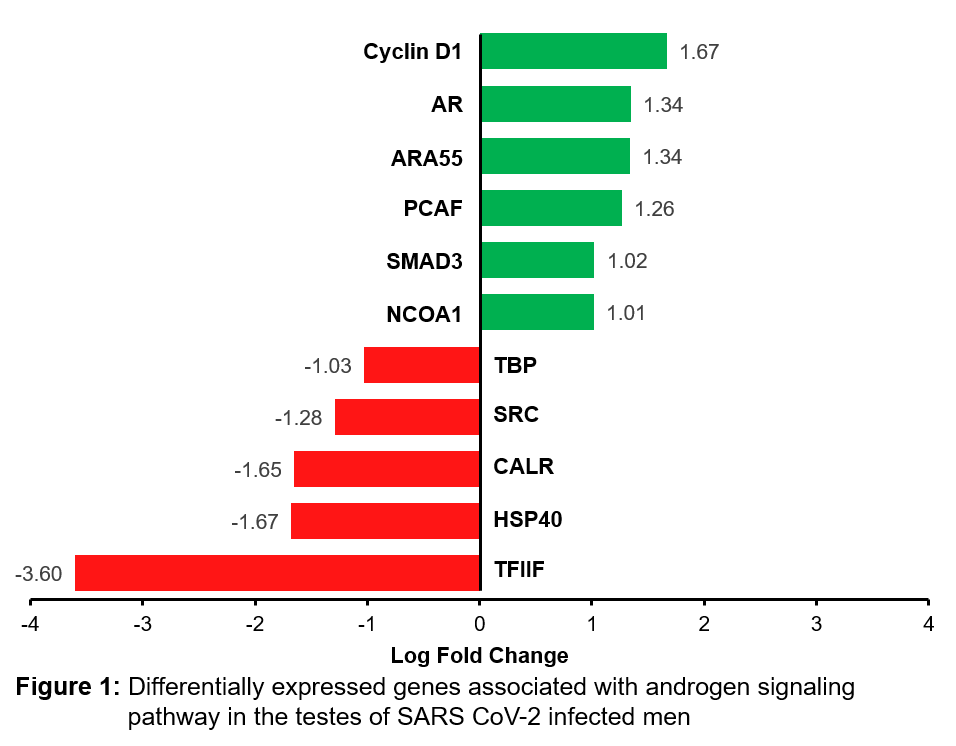Back
Poster, Podium & Video Sessions
Moderated Poster
MP38: Sexual Function/Dysfunction: Basic Research & Pathophysiology
MP38-13: Data Mining and Bioinformatic Analysis Reveal Dysregulation of Androgen Biosynthesis and Signaling Pathways in Testis of SARS-CoV-2 Infected Men
Sunday, May 15, 2022
7:00 AM – 8:15 AM
Location: Room 222
Manesh Kumar Panner Selvam*, Saradha Baskaran, New Orleans, LA, Peter Natesan Pushparaj, Jeddah, Saudi Arabia, Suresh Sikka, New Orleans, LA

Manesh Kumar Panner Selvam, PhD
Tulane University School of Medicine
Poster Presenter(s)
Introduction: COVID-19 caused by severe acute respiratory syndrome coronavirus 2 (SARS CoV-2) impacts male reproductive health. Nearly 50% of men who recovered from COVID-19 (without vaccination) had low levels of testosterone/androgen and thus, are at greater risk of developing hypogonadism. Although a recent transcriptomic report showed molecular alterations in the testis of SARS-CoV-2 infected men, their impact on androgen biosynthesis and associated signaling pathways is unknown. The main objective of this study is to analyze androgen biosynthesis and signaling pathways in testis of COVID-19 patients using a bioinformatic approach.
Methods: Transcriptomic data (PRJNA661970) of testis from men infected with SARS-CoV-2 were retrieved from European Nucleotide Archive (ENA). The FASTQ files were processed using the BioJupies web tool (http://biojupies.cloud) to identify the differentially expressed genes (DEGs) in the SARS CoV-2 infected group compared to the control group (non-infected). Furthermore, DEGs were subjected to downstream analysis using Ingenuity Pathway Analysis (IPA) software (Qiagen, USA) to investigate both androgen biosynthesis and associated signaling pathways.
Results: Data mining and analysis resulted in the identification of 8,906 DEGs, among which 101 genes (40 downregulated and 61 upregulated) were found to be associated with hypogonadism. IPA analysis revealed that the function of enzymes involved in the androgen biosynthesis such as steroid 17a-monooxygenase, 17a-hydroxyprogesterone aldolase, steroid D-isomerase, testosterone 17ß-dehydrogenase (NADP) and 3-oxo-5a-steroid 4-dehydrogenase were differentially regulated by the DEGs. Furthermore, expression of molecules regulating the androgen signaling pathways were altered in the testes of men infected with SARS-CoV-2 (Figure 1).
Conclusions: Our findings demonstrate that androgen biosynthesis and associated signaling pathways important for testosterone production are dysregulated in testis of men infected with COVID-19. This may result in prolonged testosterone deficiency leading to hypogonadism in COVID-19 patients. Future studies are warranted to assess the impact of SARS-CoV-2 on accessory sex glands (especially prostrate) which are under the regulation of androgen signaling pathway.
Source of Funding: None

Methods: Transcriptomic data (PRJNA661970) of testis from men infected with SARS-CoV-2 were retrieved from European Nucleotide Archive (ENA). The FASTQ files were processed using the BioJupies web tool (http://biojupies.cloud) to identify the differentially expressed genes (DEGs) in the SARS CoV-2 infected group compared to the control group (non-infected). Furthermore, DEGs were subjected to downstream analysis using Ingenuity Pathway Analysis (IPA) software (Qiagen, USA) to investigate both androgen biosynthesis and associated signaling pathways.
Results: Data mining and analysis resulted in the identification of 8,906 DEGs, among which 101 genes (40 downregulated and 61 upregulated) were found to be associated with hypogonadism. IPA analysis revealed that the function of enzymes involved in the androgen biosynthesis such as steroid 17a-monooxygenase, 17a-hydroxyprogesterone aldolase, steroid D-isomerase, testosterone 17ß-dehydrogenase (NADP) and 3-oxo-5a-steroid 4-dehydrogenase were differentially regulated by the DEGs. Furthermore, expression of molecules regulating the androgen signaling pathways were altered in the testes of men infected with SARS-CoV-2 (Figure 1).
Conclusions: Our findings demonstrate that androgen biosynthesis and associated signaling pathways important for testosterone production are dysregulated in testis of men infected with COVID-19. This may result in prolonged testosterone deficiency leading to hypogonadism in COVID-19 patients. Future studies are warranted to assess the impact of SARS-CoV-2 on accessory sex glands (especially prostrate) which are under the regulation of androgen signaling pathway.
Source of Funding: None


.jpg)
.jpg)